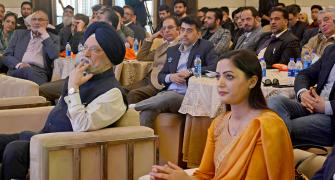World Bank said on Thursday that the Indo-Asean free trade agreement would turn out to be a futile exercise unless India makes conscious efforts to lower tariffs and remove non-tariff barriers further.
"The tie up with Asean is provisional and is not much of a benefit to India," World Bank consultant Garry Pursell said on the sidelines of a workshop organised by ICRIER in New Delhi.
| |||||||||||
"India has to bring down its tariffs drastically before it signs the FTA with Asean," Pursell said.
He also said that India and other South Asian nations should opt for multilateral trade agreements instead of the unilateral and bilateral agreements.
While secretary in PMO, S Narayan, asserted that there should be a standardised tariff and India was moving towards the Asean levels, the World Bank said implementation of trade reforms was slow.
Apart from high tariff, the World Bank listed a number of other factors that came in the way of trade liberalisation including political protectionism, non-tariff barriers, policies relating to export and agriculture.
On the "political economy of protection", the bank said "trade policy reforms in South Asia region frequently face stiff resistance and there are active and often successful efforts not only by established interest groups but also by new firms and industries to obtain special treatment or to be excluded from trade liberalisation measures."
India still has the highest tariff rates with the general maximum duties at 30 per cent, while it is 25 per cent in Pakistan, Nepal and Bangladesh, the World Bank said.
Even though formal import restrictions have been removed, the report pointed to restrictions imposed by South Asian nations on each other's exports and imports.
In this context, it said Pakistan abolished all traditional quantitative restrictions with the important proviso -- all imports from India are banned, except for a positive list of 600 items.
Although India does not impose formal restrictions on exports to or imports from Pakistan, World Bank noted that other restrictions like that on travel, remittances and customs clearances are generally believed to have the same effect on import.
"This restriction is an outcome of the difficult political relation between India and Pakistan," it said.
World Bank also pointed to a number of GATT-compatible non-tariff import controls, which act as protective non-tariff barriers or have the potential to do so.
These NTBs imposed by India are in the form of government-mandated import monopolies or state trading enterprises, tariff rate quotas, technical standards and regulation.
"India is the principal user of STEs to control imports of rice, wheat, all coarse grains, which account for 40 per cent agriculture GDP. Urea imports are also controlled by
STEs," it said, adding TRQs are also being used by India to protect its powdered milk and maize produce.
"New rules introduced in 2000 and being administered by Bureau of Indian Standards are reported to be seriously restricting imports of steel and a number of products into India," it said.






